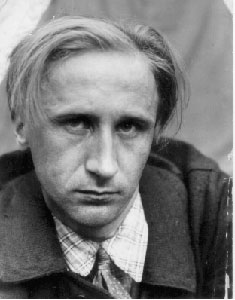HANS WERNER LÜSCHER
Hans Werner Lüscher was born in Bern, Switzerland on February 5, 1901. Little is known of his parents. In his autobiographical narrative, Hans describes how as a small child he was neglected by his mother; how he ran away from home; how he came to foster parents; and how he was finally put into a Boys Farm, a place for difficult boys, where his education consisted of work on the farm and corporal punishment. In spite of these troubled years, he was already finding himself as a writer. At the age of 17 he left the Boys Farm, worked as a salesman, and took up night studies.
In 1923 Hans emigrated to Canada where he led the life of a migratory worker, writing occasional reports for a Swiss Weekly, in which he described his arrival in Halifax Canada among a shipload of European Emigrants, his travels through Canada to the Rocky Mountains as a migratory worker, and the years he spent in the West, mainly in Lake Louise.
Hans was granted a United States Immigrant Visa in 1929 and moved to Los Angeles. He became a US citizen in 1953. In Los Angeles he worked as a carpenter during the day and wrote at night. In essence Hans was a thinker, a seeker, a philosopher, and carpentry was only a means to subsist. His life was like a coin, with two completely different sides, each being important and yet only indirectly related to the other. Upon his return home from his daily tiresome work, writing was his relaxation, and he used to write deep into the night. Hans could easily have become a foreman at his place of work, but he rejected all such offers, since it would have meant less time for his writing.
He wrote newspaper articles, poems, and philosophical essays which he recorded in what he called his “day books.” Through his writing he strove to deal with the personal problems he experienced as a result of his unhappy youth.
|

The distressful relationship with his mother is a perpetual subject in his writings, and he ascribes his inability to have a normal sexual relationship with a woman to the lack of love and affection he experienced from her.
Although Swiss German was his mother tongue, English had long become his preferred second language, and he learned to write it well. Reading classic literature kept his mind busy, and the Public Library of Los Angeles was his favorite source for books he could not afford to buy. It was at the library that he became acquainted with Emily Dickinson’s poetry. Sometime around 1944 he decided to translate her poems into German. It was during this translation work that Hans made his sensational discovery which was to occupy him for the rest of his life. He discovered that Emily had created a double language in her poems, with symbols, similes and parables, through which she expressed her erotic experiences in lush detail.
Back
|
|